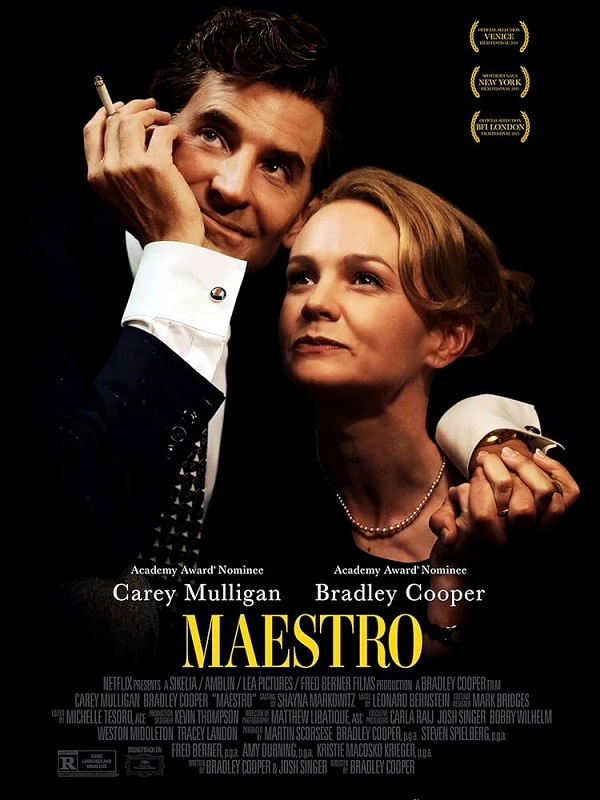

2023 – Maestro
This was a good movie. It was a dramatic biopic about the career and personal life of one of the greatest classical composers of the twentieth century, Leonard Bernstein. It started off with the random, fateful event in 1943 that accelerated his professional career into high-gear, and made him a huge success in the world of classical conducting, and ended not long after the death of his wife in 1978, with a quick snip of him in 1987. But really, the film is more about his relationship with his wife, Felicia, and his homosexuality.
Bradley Cooper, who not only starred as Bernstein, himself, but who also directed the film, did a fantastic job of bringing the man to life. He looked the part, and was able to portray him at various ages over the film’s nearly fifty year time-span. The way they were able to make him look like Bernstein as a young man, and as an old man was amazing. But as much as the film was about him, it was also about his marriage to Felicia Montealegre, expertly played by Carrie Mulligan. And really, those were the only two characters of note in the film.
Maybe three others might be important enough to be mentioned as supporting characters. Matt Bomer played one of Leonard’s lovers, David Oppenheim. Gideon Glick played Tommy Cothran, a musicologist and composer, who was another of Bernstein’s important lovers. And third, I should make mention of Maya Hawke, playing one of Leonard’s daughters, Jamie, who expresses distress over rumors of her father’s homosexual affairs, of which, apparently, there were many.
Yes, there were other actors playing other real-life people in this biopic, but they came on the screen quickly without really being introduced or identified, and were off again just as quickly. You’d have to be already familiar with Bernstein’s life and acquaintances to really know who they were. For example, I don’t remember Aaron Copeland as being a character in the film’s narrative, but he was apparently played by Brian Klugman. Or there was Vincenzo Amato, who played Bruno Zirato, but I have no idea who Bruno Zirato is, or was, and since he had no real significance to the plot, he had no real significance to me.
No, the real interest in the film was the relationship between Leonard and Felicia. It is where all the drama and the romance was centered, and it took up most of the film. Even Bernstein’s prolific career seemed to be secondary to the story of the troubled marriage. You see, Felicia always knew about Leonard’s homosexual dalliances, but she married him anyway, because of his genius, his success, and yes, because of his love. Because the movie made it very clear that despite his sexual preference for men, he was fully in love with Felicia, as well. He supported her in her career, he cared for her when she was diagnosed with cancer, and he mourned for her after her death.
But of the two characters, I often found her to be more interesting. She knew he was gay, and though she didn’t like it, she tolerated it. She was mostly just opposed to his sloppiness in managing his affairs. She objected to how it affected her family and her children. She was the long suffering wife who rarely complained, but at the same time, it was a role she walked into with her eyes open. And when tragedy struck, everything changed. Her struggles with cancer and chemotherapy took their toll. The steady decline of her health was heartbreaking to watch as it played out on the screen.
Cooper and Mulligan were both nominated for acting awards for their performances, and I really think they deserved the recognition. They were both phenomenal and I’d have been surprised if they hadn’t been nominated for Oscars. They both had a realism and a dramatic weight to them that was undeniable. I especially liked Mulligan as she drew my attention each time she was on the screen. The pair had an on-screen chemistry that really drew me in to the story.
And then there was the music. You couldn’t make a movie about Leonard Bernstein without featuring some of his music, and his legendary conducting triumphs. Apparently, Cooper was coached in conducting, specifically paying tribute to Bernstein’s personal style. He really knocked it out of the park. The incredible scene of him conducting Mahler’s Resurrection Symphony at Ely Cathedral was powerful, both dramatically for the plot, and musically. It was emotional and captivating, and Cooper disappeared into the scene. He was Leonard Bernstein!
And the film was also a little educational. For instance, I was not really aware that Bernstein was a drug user or a partier late in his life, and while Maestro didn’t focus on these things, it did mention them, even if it was only in passing. All in all, it was a good movie. But it wasn’t perfect. I just wish I knew more about who certain characters were, and why they were historically significant. Sometimes he’d be talking to someone, and I because I didn’t know who they were, I think I missed some of the importance of what was being said. But that is a pretty minor complaint. Despite that, the drama and romance of the marriage was easy to follow, as was the course of his great career. And that’s what the movie was about.








